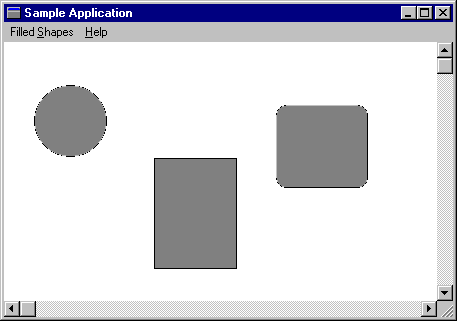Usando formas preenchidas
Esta seção ilustra como usar funções de forma preenchidas. O exemplo usa o procedimento de janela main de um aplicativo que permite que o usuário desenhe reticências, retângulos e retângulos com cantos arredondados.
O usuário desenha uma forma preenchida selecionando uma forma específica no menu, posicionando o cursor no canto superior esquerdo da forma (ou o retângulo delimitador da forma no caso de uma elipse) e arrastando o mouse até que as dimensões desejadas sejam obtidas.
A ilustração a seguir mostra três formas preenchidas desenhadas usando o código de exemplo nesta seção.

Para permitir que o usuário desenhe formas preenchidas, inclua o menu pop-up a seguir em seu aplicativo.
POPUP "Filled &Shapes"
{
MENUITEM "&Ellipse", IDM_ELLIPSE
MENUITEM "&Rectangle", IDM_RECTANGLE
MENUITEM "R&oundRect", IDM_ROUNDRECT
}
Os valores do item de menu no modelo de menu são constantes que você deve definir da seguinte maneira no arquivo de cabeçalho do aplicativo.
#define IDM_ELLIPSE 1100
#define IDM_RECTANGLE 1200
#define IDM_ROUNDRECT 1300
Por fim, inclua o procedimento de janela a seguir em seu aplicativo.
BOOL CALLBACK MainWndProc(HWND hwnd, UINT uMsg, WPARAM wParam,
LPARAM lParam)
{
HDC hdc; // handle to device context (DC)
PAINTSTRUCT ps; // paint data for Begin/EndPaint
POINT ptClientUL; // client area upper left corner
POINT ptClientLR; // client area lower right corner
static HDC hdcCompat; // handle to DC for bitmap
static POINT pt; // x- and y-coordinates of cursor
static RECT rcTarget; // rect to receive filled shape
static RECT rcClient; // client area rectangle
static BOOL fSizeEllipse; // TRUE if ellipse is sized
static BOOL fDrawEllipse; // TRUE if ellipse is drawn
static BOOL fDrawRectangle; // TRUE if rectangle is drawn
static BOOL fSizeRectangle; // TRUE if rectangle is sized
static BOOL fSizeRoundRect; // TRUE if rounded rect is sized
static BOOL fDrawRoundRect; // TRUE if rounded rect is drawn
static int nEllipseWidth; // width for round corners
static int nEllipseHeight; // height for round corners
switch (uMsg)
{
case WM_COMMAND:
switch (wParam)
{
// Set the appropriate flag to indicate which
// filled shape the user is drawing.
case IDM_ELLIPSE:
fSizeEllipse = TRUE;
break;
case IDM_RECTANGLE:
fSizeRectangle = TRUE;
break;
case IDM_ROUNDRECT:
fSizeRoundRect = TRUE;
break;
default:
return DefWindowProc(hwnd, uMsg, wParam,
lParam);
}
break;
case WM_CREATE:
nEllipseWidth = 20;
nEllipseHeight = 20;
return 0;
case WM_PAINT:
BeginPaint(hwnd, &ps);
// Because the default brush is white, select
// a different brush into the device context
// to demonstrate the painting of filled shapes.
SelectObject(ps.hdc, GetStockObject(GRAY_BRUSH));
// If one of the filled shape "draw" flags is TRUE,
// draw the corresponding shape.
if (fDrawEllipse)
{
Ellipse(ps.hdc, rcTarget.left, rcTarget.top,
rcTarget.right, rcTarget.bottom);
fDrawEllipse = FALSE;
rcTarget.left = rcTarget.right = 0;
rcTarget.top = rcTarget.bottom = 0;
}
if (fDrawRectangle)
{
Rectangle(ps.hdc, rcTarget.left, rcTarget.top,
rcTarget.right, rcTarget.bottom);
fDrawRectangle = FALSE;
rcTarget.left = rcTarget.right = 0;
rcTarget.top = rcTarget.bottom = 0;
}
if (fDrawRoundRect)
{
RoundRect(ps.hdc, rcTarget.left, rcTarget.top,
rcTarget.right, rcTarget.bottom,
nEllipseWidth, nEllipseHeight);
fDrawRectangle = FALSE;
rcTarget.left = rcTarget.right = 0;
rcTarget.top = rcTarget.bottom = 0;
}
EndPaint(hwnd, &ps);
break;
case WM_SIZE:
// Convert the client coordinates of the client area
// rectangle to screen coordinates and save them in a
// rectangle. The rectangle is passed to the ClipCursor
// function during WM_LBUTTONDOWN processing.
GetClientRect(hwnd, &rcClient);
ptClientUL.x = rcClient.left;
ptClientUL.y = rcClient.top;
ptClientLR.x = rcClient.right;
ptClientLR.y = rcClient.bottom;
ClientToScreen(hwnd, &ptClientUL);
ClientToScreen(hwnd, &ptClientLR);
SetRect(&rcClient, ptClientUL.x, ptClientUL.y,
ptClientLR.x, ptClientLR.y);
return 0;
case WM_LBUTTONDOWN:
// Restrict the cursor to the client area.
// This ensures that the window receives a matching
// WM_LBUTTONUP message.
ClipCursor(&rcClient);
// Save the coordinates of the cursor.
pt.x = (LONG) LOWORD(lParam);
pt.y = (LONG) HIWORD(lParam);
// If the user chooses one of the filled shapes,
// set the appropriate flag to indicate that the
// shape is being sized.
if (fDrawEllipse)
fSizeEllipse = TRUE;
return 0;
case WM_MOUSEMOVE:
// If one of the "size" flags is set, draw
// the target rectangle as the user drags
// the mouse.
if ((wParam && MK_LBUTTON)
&& (fSizeEllipse || fSizeRectangle
|| fSizeRoundRect))
{
// Set the mixing mode so that the pen color is the
// inverse of the background color. The previous
// rectangle can then be erased by drawing
// another rectangle on top of it.
hdc = GetDC(hwnd);
SetROP2(hdc, R2_NOTXORPEN);
// If a previous target rectangle exists, erase
// it by drawing another rectangle on top.
if (!IsRectEmpty(&rcTarget))
{
Rectangle(hdc, rcTarget.left, rcTarget.top,
rcTarget.right, rcTarget.bottom);
}
// Save the coordinates of the target rectangle.
// Avoid invalid rectangles by ensuring that the
// value of the left coordinate is greater than
// that of the right, and that the value of the
// bottom coordinate is greater than that of
// the top.
if ((pt.x < (LONG) LOWORD(lParam)) &&
(pt.y > (LONG) HIWORD(lParam)))
{
SetRect(&rcTarget, pt.x, HIWORD(lParam),
LOWORD(lParam), pt.y);
}
else if ((pt.x > (LONG) LOWORD(lParam)) &&
(pt.y > (LONG) HIWORD(lParam)))
{
SetRect(&rcTarget, LOWORD(lParam),
HIWORD(lParam), pt.x, pt.y);
}
else if ((pt.x > (LONG) LOWORD(lParam)) &&
(pt.y < (LONG) HIWORD(lParam)))
{
SetRect(&rcTarget, LOWORD(lParam), pt.y,
pt.x, HIWORD(lParam));
}
else
{
SetRect(&rcTarget, pt.x, pt.y, LOWORD(lParam),
HIWORD(lParam));
}
// Draw the new target rectangle.
Rectangle(hdc, rcTarget.left, rcTarget.top,
rcTarget.right, rcTarget.bottom);
ReleaseDC(hwnd, hdc);
}
return 0;
case WM_LBUTTONUP:
// If one of the "size" flags is TRUE, reset it to FALSE,
// and then set the corresponding "draw" flag. Invalidate
// the appropriate rectangle and issue a WM_PAINT message.
if (fSizeEllipse)
{
fSizeEllipse = FALSE;
fDrawEllipse = TRUE;
}
if (fSizeRectangle)
{
fSizeRectangle = FALSE;
fDrawRectangle = TRUE;
}
if (fSizeRoundRect)
{
fSizeRoundRect = FALSE;
fDrawRoundRect = TRUE;
}
if (fDrawEllipse || fDrawRectangle || fDrawRoundRect)
{
InvalidateRect(hwnd, &rcTarget, TRUE);
UpdateWindow(hwnd);
}
// Release the cursor.
ClipCursor((LPRECT) NULL);
return 0;
case WM_DESTROY:
// Destroy the background brush, compatible bitmap,
// and bitmap.
DeleteDC(hdcCompat);
PostQuitMessage(0);
break;
default:
return DefWindowProc(hwnd, uMsg, wParam, lParam);
}
return (LRESULT) NULL;
}